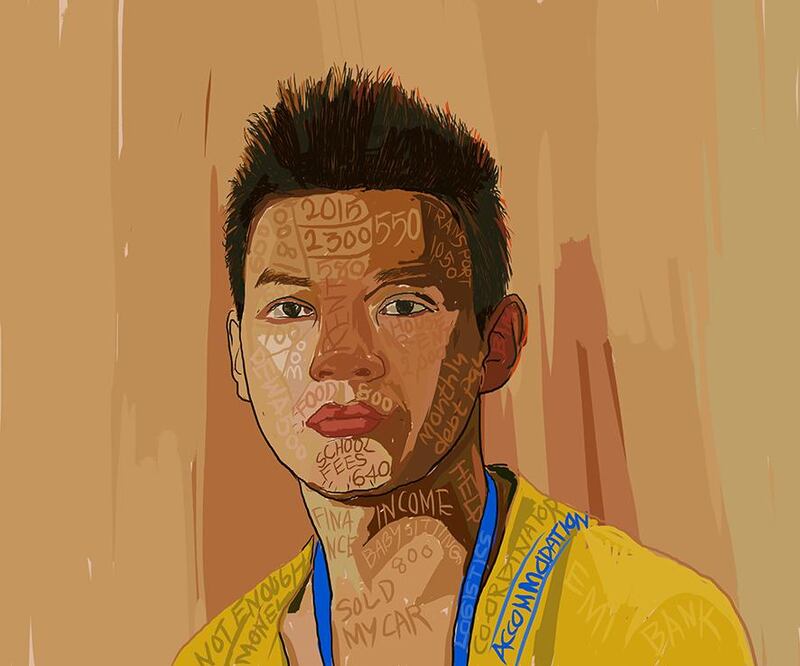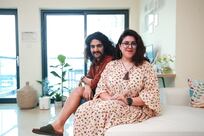I have worked as a logistics coordinator for more than six years with a monthly income of Dh8,750. I am in considerable debt and have tried everything to resolve my situation.
I live in Al Warsan with my wife and two children, aged 10 and three. My financial trouble started when we tried to help some people in need. I used my credit card to take out a loan on a card to help a friend and a cousin come to Dubai from my native Philippines to search for a job. Unfortunately I lost contact with them and they stopped paying me back. My wife stopped working for almost seven months as she was not being paid. I asked for help from a credit adviser hoping they could help me negotiate with the banks but it did not work out.
I sold my car and paid off the interest of some of the cards but it is not enough. We have also moved into smaller accommodation and we are living on a very tight budget - only buying what we need. Sending back our children to the Philippines is not an option as nobody wants to take care of them. My wife just started working last month with a monthly salary of Dh3,000 plus a Dh1,000 accommodation and transportation allowance.
I have asked the banks to restructure the credit cards to a monthly payment. Two banks agreed to restructure my cards but the EMI they have given me is very high and I have explained to them I cannot guarantee I will pay it monthly. Their representative told me to try for a few months and if I cannot pay the amount, then they will see what they can do. We have already used our savings and borrowed money from our friends to cover the payments but it's come to a point where nobody wants to lend us money.
Our monthly expenses:
House rent: Dh2,000
DEWA: Dh500
Food: Dh800
Transport: Dh1,050
School Fees: Dh640
Babysitting: Dh800
Total: Dh5,980
Monthly debt payments (amount to pay / amount borrowed)
Debt 1: Dh2,015 / Dh40,000
Debt 2: Dh550 / Dh17,000
Debt 3: Dh2,300 / Dh56,000
Debt 4: Dh580 / Dh17,000
Debt 5: Dh1,800 / Dh21,000
Debt 6: Dh 600 / Dh10,000
Debt 7: Dh600 / Dh10,000
Debt 8: Dh700 / Dh10,000
Debt 9: Dh300 / Dh4,500
Total owed: Dh185,500
If these lenders extend their help to reduce the monthly payment into a manageable amount that I can afford to pay, then my payments can be regularised. It will benefit both parties. What should I do now? JG, Dubai
Debt panellist 1: Philip King, the head of retail banking at Abu Dhabi Islamic Bank
I’m glad that you understand the path you face to become debt free, and that you have already taken sensible first steps on this journey. While your descent into debt follows an unfortunate set of circumstances, I’m afraid that it once again demonstrates the need to put one’s financial interests first and encourage friends
or family to deal directly
with banks to manage their own affairs.
As an initial step, you have done well to go and speak with your banks as well as engaging with a credit advisor. Selling your car and moving into smaller accommodation
while living on a frugal budget must have been tough, but it demonstrates that you are willing to make sacrifices to repay your loans.
With nine separate loans or credit cards (it is not clear from your letter which are loans or cards) if any have come from the same bank you should certainly re-approach them and work out a plan to consolidate your loans for each institution.
In addition, I would urge you to talk with your banks again and show them the full extent of all your loans and monthly payments along with a solid, well-planned proposal for paying them all off, taking into account your salary and monthly expenses. This will likely involve restructuring the loans over a longer tenure, but it will ease the monthly strain of repayments which is currently unsustainable.
It is worth noting that as your debt of Dh185,000 exceeds the amount that banks are allowed to lend you in accordance with central bank regulations, which would be Dh175,000, or 20 times your salary of Dh8,750, you will probably not be eligible to receive additional lending from any financial institution. However, you may be able to seek a one-month repayment deferral which will provide time and financial lee-way for you to speak again to your banks about combining repayments into more manageable monthly instalments.
To conclude, the best way forward is to compile a comprehensive plan of your proposed payments which includes an accounting of all your current debts and speak again to your banks. You are right that such a proposal will be beneficial to both parties, and if you are able to make the case convincingly, you will be on the road to paying these debts off.
________
Read more:
________
Debt panellist 2: Ambareen Musa, founder and chief executive of Souqalmal.com
You and your spouse earn a combined monthly income of approximately Dh13,000 a month, however close to half of this is spent on basic living expenses. You have to find a way to lower your expenses so you can use the majority of your income to get out of the pool of debt that you're stuck in.
While I understand your concerns about sending the children back to the Philippines, have you considered moving your wife and children back together? Even if this arrangement is temporary and only for a year or two, it can significantly ease your financial burden and help free up extra cash so you can repay your debts sooner. If your wife gets a job back home that doesn't pay as much as she makes here, the considerably lower living expenses and school fees will leave you financially better off. You can then move to a smaller and cheaper accommodation in Dubai.
The money that you will now be saving on rent, utilities, transport, schooling and childcare, can be used to pay off the credit card debt. Initially you can pay off the credit card debt that has been converted into fixed monthly payments. However, make sure that you don't skip the minimum payments on all the other cards as doing so will attract late payment fees and heavy penalties.
Once the fixed payments are out of the way, you can start using your savings to pay the outstanding credit card bills one by one. Start with the card that's accumulating interest at the highest rate of them all. Alternatively, you can also start with the card that has the smallest outstanding balance so you can check it off your list sooner.
You can also explore the debt consolidation option once a few of your credit cards have been paid in full and closed off. A good way to start would be to initiate a conversation with your primary bank where your salary gets credited. Try to negotiate a debt consolidation plan wherein the bank agrees to club what you owe to them along with your remaining credit card debts. This can help reduce the overall interest rate charged and make your monthly repayments far more manageable.
________
Read more:
The Debt Panel: Microbiologist borrowed Dh125,000 to salvage his wife's failing business
________
Debt panellist 3: Rasheda Khatun Khan, a wealth and wellness planner
It's inevitable to reach the point where no bank or friend is willing to lend more money. It's a short-term solution for a long standing problem. Taking out another consolidation role needs to be carefully considered.
Firstly you need to ensure you can commit to the monthly commitment for the duration of the loan. Secondly the amount of the loan needs to be enough to pay off the credit cards first. Thirdly make sure you have an emergency fund included. Not having a cash reserve is the number one reason people start falling into debt. Finally, what is most important and what will keep you out of debt going forward is cash flow. Having a system for the way that you spend is crucial. Spending within your means and being able to build a cash reserve is going to keep you on the right side of the line. This again is the most important step. Not getting this right means in no time at all you are right back where you started, in need of a consolidation loan.
Also carefully consider if sending your wife and children back as a temporary option. If it will reduce your monthly commitments then this should be considered at least until you get yourself back on track. If you have any other assets like property or land, look into selling these to release funds.
A common pattern we are seeing more and more with UAE expats is taking cash from your credit card as a means of a long-term loan solution. This should be your absolute last resort as it is the most expensive form of a loan. It never ever is a good solution to make investments with, nor is it a good solution to start a business with and most definitely it is not a good solution to loan a friend money. No "deal" is worth it. It means whatever you are "investing" in, needs to make over 20 per cent interest per year just to cover the cost of the borrowing. Think twice or three times before you withdraw cash from your credit card. Unless it's an emergency situation and you have a solid short-term repayment plan, don't do it.
On this panel this week: Philip King, the head of retail banking at Abu Dhabi Islamic Bank; Ambareen Musa, founder and chief executive of Souqalmal.com and Rasheda Khatun Khan, a wealth and wellness planner and founder of Design Your Life
The Debt Panel is a weekly online column to help readers tackle their debts more effectively. If you have a question for the panel, write to pf@thenational.ae.







